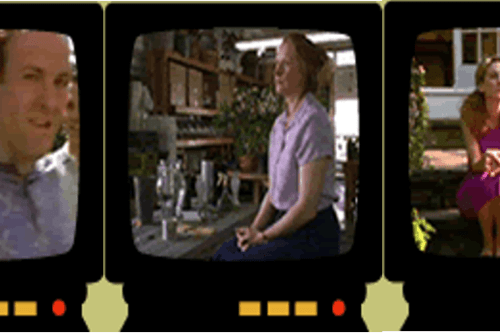Sex work has always been relevant to queer and trans communities, both as a livelihood option and as an issue that critically informs the space between social and political margins, and the centralities of queer and trans communities. The vital set of issues raised by the intersections of sex worker and queer populations has not always been addressed by LGBT/Q organizations, however. This essay brings the complex history of those intersections into sharp relief, in order to make a case for the importance of thinking politically about sex work and queer life today.
This essay presents a synthesis of interviews with three New York City-based activists, Amber Hollibaugh, Ignacio Rivera, and Felix Gardon, conducted in March 2008 at New York University. In the course of each interview, Amber, Ignacio, and Felix discuss their own experiences of sex work, and how these experiences inform their work in LGBT movements. Their interviews describe the arc of contemporary LGBT history in the United States, from the late 1960s to the 1969 Stonewall Rebellion, through the formation of LGBT organizations and infrastructure to present-day struggles about the priorities and directions of our collective agenda.
The interviews address a range of issues that are central to understanding the relationship between sex work and LGBT communities—especially the history of the LGBT movement in the United States, and the value that sexual liberation had initially to the formation of “gay rights.” Amber describes the culture of gay bars during the 1960s and 1970s, and of queer and trans spaces that included a wide array of sexually marginalized communities, including sex workers. She goes on to describe the changes in the politics of queer sex cultures spurred on by the era of AIDS, emphasizing the stark class divisions there, as well as the emergence of politicized distinctions between sexually normative and non-normative queer and trans people. Ignacio takes up these themes in reflecting on the contemporary context, considering where and how concepts of polyamory, sexual liberation, and class intersect with sex work. Felix goes on to describe doing sex workers’ rights organizing in Philadelphia, focusing on the ways that gender inflects the politics of sex work and sexuality. All three argue that sex work and LGBT communities intersect, and that understanding this intersection is critical for re-evaluating the impact of contemporary homonormative politics.
Amber Hollibaugh
Amber Hollibaugh has been involved in LGBT organizing for decades, bearing witness to the movement since the 1960s. She has worked on numerous issues over the years with many diverse LGBT organizations including the Lesbian AIDS Project at GMHC (Gay Men’s Health Crisis), Services and Advocacy for GLBT Seniors (SAGE), and the National Gay and Lesbian Task Force. She is currently chief officer of elder and LBTI women’s services at Howard Brown Health Center in Chicago. Amber’s history within the movement is documented in her book, My Dangerous Desires: A Queer Girl Dreaming Her Way Home, published in 2000 by Duke University Press. An excerpt from that book is reprinted in this issue.
AH: You know, it’s not an accident that the Stonewall Rebellion [New York City, 1969] was made up of bulldaggers, drag queens, trans people, sex workers […]. Those were the people who were the outlaws of an already outlawed world, which was a queer world at that point. And they were the edges of that queer world. That’s who you could find who would be publicly out around being queer. The earlier women’s movement—the feminist movement—and the queer movement were originally, I think, much more radical movements politically and in their make-up—not just in what they thought, but who was in [them], too.
There were public cultures of LGBT people then, and those public cultures were very embedded in sex work. In the long history of the lesbian and gay world, gay bars were sexual outlaw sites that configured a lot of different communities: gay men, lesbians, sex workers, and the drag community, for example. I’m talking about pre-Stonewall and in that early Stonewall moment. And not just in the Northeast but actually across the United States. People act as though sex work and issues of sexual normalization are new issues, part of a new conversation, as though sex work wasn’t really a part of how queer life was constructed before there was a movement. But the history that’s important to remember here is that, relative to the way “normal” sexuality was constructed in the 1950s, you had a whole lot of people who didn’t fit in, of which gay people were the most organized. I mean, I think gay bars had all of those different configurations of people, so we could have something like a bar that would become a place, not where people who were sexual minorities necessarily liked each other, but where people tolerated each other because they knew that on the outside they were despised.
As there began to be a bigger and bigger gay movement in the 1960s and 1970s, the politics of sex was much more radical. So you had promiscuity as a value, not as a deviation, but as a value. Certainly for gay men. For women it was very complicated, trying to figure out a radical practice, even if you had radical ideas. There were no real institutions that helped you play out that practice. For some, that “institution” was S/M [communities that experimented with sadomasochism and bondage and discipline]. For those of us that were not in the S/M community, that “institution” was being in butch-femme relationships or other kinds of sexual minority relationships. We all clustered around each other because we all accepted each other. Within that kind of world of the 70s just before AIDS, […] the sexual values were more expansive and nonmonogamous and radical.
There were a lot of different configurations of that: many sex workers, many people who crossed over sometimes, working in the bars, and sometimes the bar would close and, you know, you’d hook for a few months and then you’d settle down with somebody for six months. I mean people configured their lives in a way that allowed them economic survival, and if you wanted a radical life, you had to configure a life that was unstructured, because you couldn’t go to a nine-to-five job and go to a demonstration during the day. It just didn’t configure. So, I mean, I didn’t do sex work because I wanted to have nontraditional work hours. I did sex work because I had done it for years. And I didn’t have other employment choices that were at all acceptable. I mean they were just miserable. I know the world of sex work can be really rough and not an easy thing to generalize about, but for many of us, sex work was so much more a privileged place of work in relation to the choices that we would have had to make otherwise. The choice between that and the other kinds of jobs I had in dry-cleaning plants, cleaning floors at night in big corporate buildings, picking fruit, or you know, cleaning fish for tuna-canning plants […]. The job that worked the best for me, when I could make it work well, was sex work or something in the sex trade.
By the time it was the 1980s, I wasn’t doing sex work anymore. I was in New York but I was trying to build a life off of having lived that way all through the 1970s. I had been a radical organizer, and that was part of why I continued also to do sex work, because it would allow me to go anywhere and do organizing anywhere. In the AIDS world [of the 1980s], you had to deal with sex work all the time. I mean it really was common, and if you were promiscuous, it was considered to be an informal kind of sex work. And if you were a sex worker you were a particular target of the state—of public health officials, who considered you one of the most dangerous forms of possible transmission for the illness. Completely ridiculous. But we had really serious, long, heated arguments with the Department of Health over whether or not there should be mandatory testing of sex workers. Any street walker for sure was supposed to be tested. So you were just having these kinds of fights.
When I started the Lesbian AIDS Project [at Gay Men’s Health Crisis], it had twelve clients. When I left it had 4,000, 2,000 of whom were women in New York who partnered with women who had HIV. At least a third to a half of those women were sex workers, and at least three quarters of them were endlessly incarcerated. You could not divorce that lesbian identity—or trans identity—from sex work, HIV infection, poverty, and incarceration. But those 2,000 lesbians were never visible anywhere in the political markers for lesbian feminism. Never. Their stories were never at the center; they were never invited. It was as if those markers of queer identity and how it’s completely intertwined with sex work and difficult choices never existed.
I think there’s this whole strain of people who run organizations and formulate policy that’s based on normalization. But there’s a whole other piece now that, I think, is some of the most extraordinary and vibrant work that’s going on, and it’s big. It’s usually driven not by identity but by issue. Like when QEJ [Queers for Economic Justice] does its class institute at Creating Change [the National Gay and Lesbian Task Force’s annual conference], it’s packed. You have to close the door at 200 people. People are like, “please explain to me what the world is because this fucking movement isn’t explaining it to me! Would somebody explain to me how this stuff comes together? Because I feel so weird when I’m sitting in my college campus, my equality organization, my dorm room, whatever, you know, because of my own background or because of what I care about that I can’t find anywhere. But I know other queer people must be thinking about it.” There’s an enormous hunger to create, again, a movement that reflects a much different understanding of difference, and of queerness in that difference, that doesn’t want to create a world that’s “the same as,” and doesn’t want to fight for “the same as” as the end result. In that, sex work includes a completely necessary set of voices that cross over and link to other political voices from the left. Those look very different and very, very, extraordinarily, fabulously alive.




